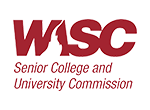
Master of Arts in
Social Emotional Learning
4-week
COURSES
Start sooner and finish faster with our innovative course design.
Year-round
enrollment
Our admissions team reviews applications year-round.
200k+ Alumni Worldwide
Become a member of NU’s global community.
Lead Transformational Change in Your School Community
If you’re looking to expand your knowledge of social and emotional learning to empower educational communities, the Master of Arts in Social Emotional Learning (SEL) is the program for you. The MA in SEL is designed to help you make transformational change in your school community as you promote the intersectionality of SEL both in and outside of the classroom.
National University’s MA in SEL is the only dedicated SEL master’s program in the country — giving you an edge in the job market. The intensive coursework in this program immerses you in every aspect of SEL, enabling you to become an expert in the field. The fast-paced program is designed for highly motivated students and can be completed in as few as 10 months.
This program will equip you with research-based knowledge and skills in self-care, cognition, trauma, and the ability to create healthy environments and relationships that are culturally responsive, equitable, and supportive for the whole child. This deep dive into personal identity, culture, leadership, community, and programs provides an SEL foundation where positive school climates thrive.
The program is focused on your success, on bringing transformative, highly personal, individualized attention from instructors in small classes. Faculty in the MA in SEL program are among leaders in the industry, offering valuable expertise in the processes and principles associated with SEL. The four-week class schedules are designed to allow you to start sooner, finish faster, and focus on one class at a time, one month at a time. To receive a Master of Social Emotional Learning, students must complete 45 quarter units of graduate work. A total of 4.5 quarter units of graduate credit may be granted for equivalent graduate work completed at another institution, as it applies to this degree and if the units were not used in earning another advanced degree, and provided the coursework was completed within the past seven years.

The Western Association of Schools and Colleges (WASC) accredits public and private schools, colleges, and universities in the U.S.
Course Details
Course Listing
Requirements for the Major
- 10 courses; 45 quarter units
Course Name
Analyze social-emotional learning (SEL) in education communities through the lens of SEL frameworks, competencies, cultural responsiveness and developmental indicators. Reflect on personal development of social-emotional competencies. Review SEL literature to develop a research focus and questions pertaining to social-emotional learning and culturally responsive classrooms.
Prerequisite: SEL 600
An investigation into how personal culture, implicit bias, stereotypes, assumptions, values, and beliefs influence personal identity and impacts our ability to engage in dynamics of difference. Students will then self-assess and reflect upon personal cultural proficiency. That self-reflection will then intersect with the SEL tenets that foster an inclusive learning environment to construct a personal cultural growth plan.
Prerequisite: SEL 605
How learners learn and instructors teach can be explained by brain research and by neuroscience. Social and emotional learning competencies are greatly impacted by cognition. The intersections between cognition, emotion, equity, and culture impact more than learning and can affect human creativity, innovation and critical thinking. Learners will explore how digital design and digital tools influence knowledge acquisition in a variety of learning environments.
Prerequisite: SEL 610
This course will examine and begin to formulate a four stage Action Research Plan that addresses Social Emotional Learning: 1) Clarifying vision and targets, 2) Articulating theory, 3) Implementing action and collecting data, 4) Reflecting on data and planning informed action.
Prerequisite: SEL 615
An exploration of various SEL frameworks that will provide evidence and structures for effective learning environments. Student learning is enhanced when educators are able to weave together academics with social emotional learning practices and pedagogies.
Prerequisite: SEL 620
Identification of trauma-informed strategies for developmentally diverse classrooms and implementation of prevention strategies and protective factors are explored. Addresses assimilation of knowledge about trauma into policies, procedures, and practices and examination of the teaching of tolerance.
Prerequisite: SEL 625
Examines equity-based pedagogical approaches to integrate SEL strategies and skills into academic content areas at different developmental levels. Learn how to apply evidence-based inclusive practices and examine the impact on students’ behavior and achievement outcomes. Determine how educational success can be achieved with curriculum integration strategies to support SEL and academic achievement.
Prerequisite: SEL 630
Leadership skills to promote SEL in educational settings. Evidence-based practices to create a shared vision and cultivate a positive school climate to empower students and school leaders will be examined. Learners will adopt SEL leadership skills to transform school and district culture and increase student achievement by adapting or developing policy and procedures.
Prerequisite: SEL 635
Explore assessment practices that support social and emotional learning in educational settings. Practices include: Formative Assessment Strategies, Universal Design for Learning, Authentic Assessment, Personalized Learning, portfolio and performance-based assessment. Examine assessment of SEL programs and tools that measure the effect of SEL on individual behavior, overall school climate, and school-wide implementation.
Prerequisite: SEL 600 SEL 605, SEL 610, SEL 615, SEL 620, SEL 625, SEL 630, SEL 635, & SEL 640
As the capstone course for the MA in SEL degree, learners will construct an action research project that includes the tenets of social and emotional learning. Project findings will provide evidence from scholarly literature and practitioner evidence collected throughout the program.
Degree and Course Requirements
To receive a Master of Social Emotional Learning, students must complete 45 quarter units of graduate work. A total of 4.5 quarter units of graduate credit may be granted for equivalent graduate work completed at another institution, as it applies to this degree and if the units were not used in earning another advanced degree, and provided the coursework was completed within the past seven years.
While the field of SEL is new, there is a growing job market across industries and a wide breadth of career outcomes, especially in the education sector. NU’s SEL graduate students range from traditional educators looking to strengthen their educational experience to professionals looking to switch careers. Our students come from a variety of backgrounds: teachers, school counselors, school leaders, daycare owners, criminal justice professionals, and military members.
SEL is traditionally associated with K-12 education. However, many different organizations are looking to incorporate SEL roles into their workforces, so you have flexibility to go beyond a traditional educator role if you choose. These are some of the industries that are rapidly expanding with a need for SEL:
- Healthcare
- Early childhood education
- Higher education
- Business administration
- Human resources
Learn more about the benefits of SEL or about becoming a social emotional learning specialist.
A MA-SEL degree is beneficial for a number of growing fields, including:
- Preschool and kindergarten teachers
- Elementary school teachers
- Middle school Teachers
- High school teachers
- Special education teachers
- Teaching assistants
- K-12 administrators
- School guidance counselors
- School/child social workers
- Coaches
- Recreation workers, camp counselors
Program Learning Outcomes
- Conduct and complete an action research project based on SEL research, theory, and practice that will create inclusive environments for the whole child
- Evaluate the impact of SEL competencies on student success metrics at the various developmental levels
- Distinguish the intersectionality between SEL, equity, cognition, and cultural responsiveness in educational communities
- Examine SEL communities, frameworks, programs and policies
- Develop SEL leadership skills to support teachers, administrators, and families in transforming school culture and climate
Hear From Our Faculty
Watch this video to hear Dr. Lori Piowlski from the Sanford College of Education discuss the MA in Social Emotional Learning (SEL) program and what to expect.
Admissions
Enrolling in a university is a big decision. That’s why our dedicated admissions team is here to guide you through the admissions process and help you find the right program for you and your career goals.
To that end, we’ve simplified and streamlined our application process, so you can get enrolled in your program right away. Because we accept and review applications year-round, you can begin class as soon as next month, depending on your program and location of choice.
Learn more about undergraduate, graduate, military, and international student admissions, plus admissions information for transfer students. You can also learn more about our tuition rates and financial aid opportunities.
To speak with our admissions team, call (855) 355-6288 or request information and an advisor will contact you shortly. If you’re ready to apply, simply start your application today.

4-WEEK COURSES
Why Choose National University
- Four-Week Courses
- 75+ Degree Programs
- Online or On-Site
- Year-Round Enrollment
- Military Friendly
We’re proud to be a veteran-founded, San Diego-based nonprofit. Since 1971, our mission has been to provide accessible, achievable higher education to adult learners. Today, we educate students from across the U.S. and around the globe, with over 240,000 alumni worldwide.

“As a student in this program, I feel like I’ve gained some really solid footing in certain areas like assessments, frameworks, leadership skills, and understanding the ‘why’ behind things. Having this master’s will give me the expertise to make my decisions even more powerful.”
-Sarah Wood, MA in SEL Student
Useful Links

FLEXIBLE SCHEDULE

Year of You Scholarship
Do you qualify for a needs-based scholarship? Learn more about the NU Year of You Scholarship and other scholarship opportunities to unlock the door to your dreams!
Program Disclosure
Successful completion and attainment of National University degrees do not lead to automatic or immediate licensure, employment, or certification in any state/country. The University cannot guarantee that any professional organization or business will accept a graduate’s application to sit for any certification, licensure, or related exam for the purpose of professional certification.
DISCLAIMER:
*Positions may require additional experience, training, and other factors beyond successfully completing this degree program. Depending on where you reside, many positions may also require state licensure, and it is the responsibility of the student to ensure that all licensure requirements are met. We encourage you to also review program-specific requirements with an NU advisor. Any data provided on this page is for informational purposes only and does not guarantee that completion of any degree program will achieve the underlying occupation or commensurate salary.
SOURCE: Emsi Labor Analyst- Report. Emsi research company homepage at https://www.economicmodeling.com/company/ (Report viewed: 2/10/2022). DISCLAIMER: The data provided is for Informational purposes only. Emsi data and analysis utilizes government sources to provide insights on industries, demographics, employers, in-demand skills, and more to align academic programs with labor market opportunities. Cited projections may not reflect local or short-term economic or job conditions and do not guarantee actual job growth. Current and prospective students should use this data with other available economic data to inform their educational decisions.